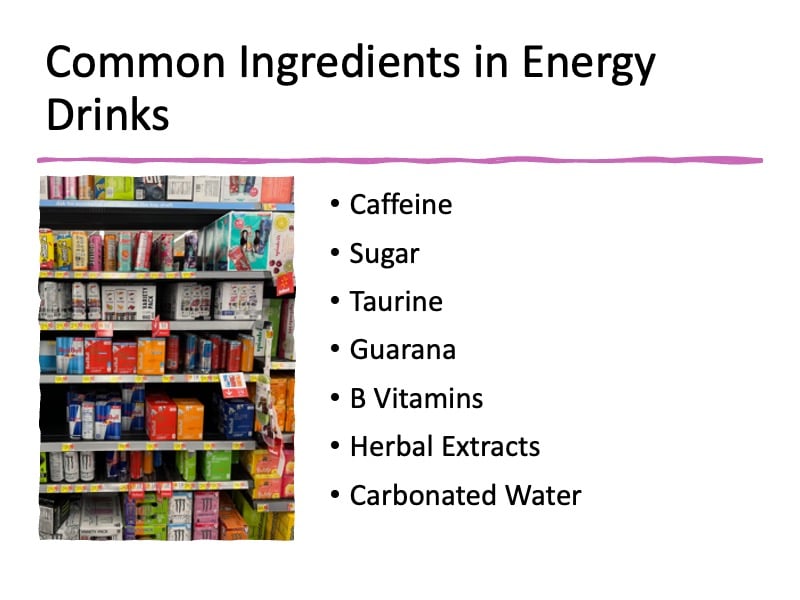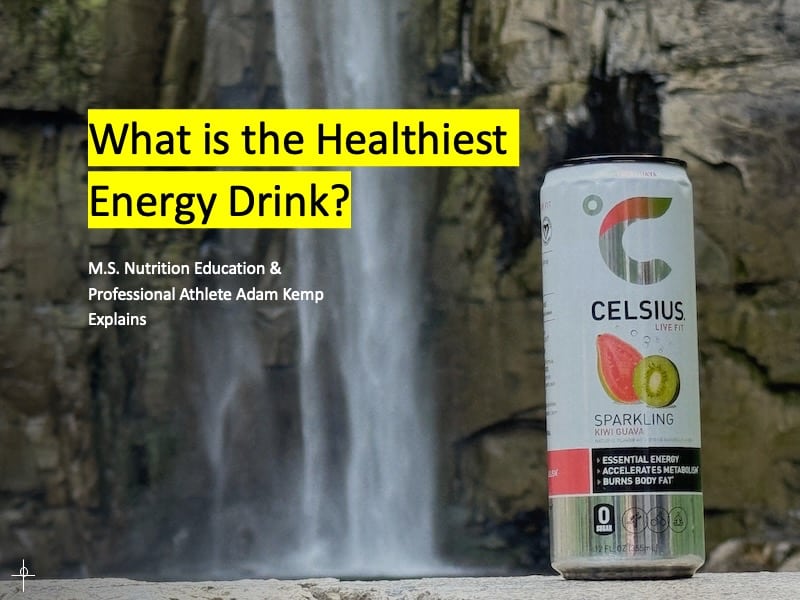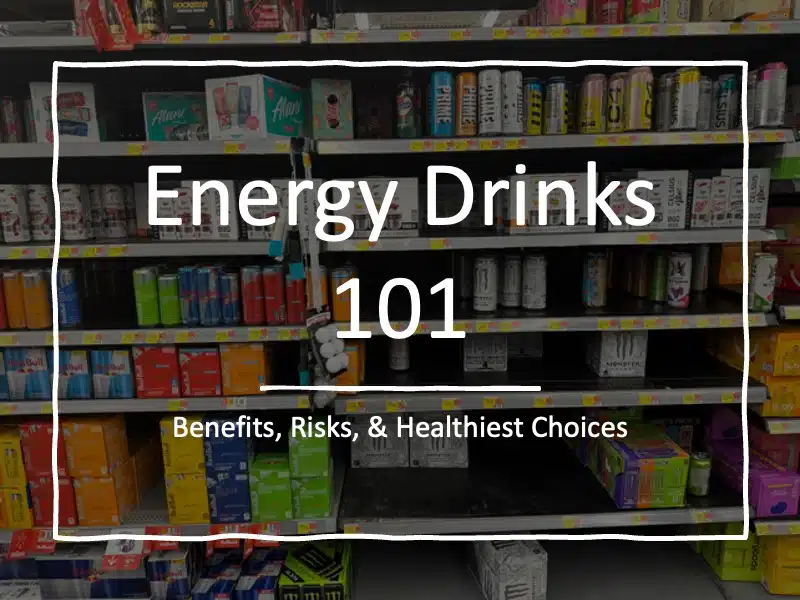Energy Drinks 101: Benefits, Risks, & Healthiest Choices
Energy drinks are a multibillion-dollar global industry, projected to reach $177.4 billion by 2030, driven by increasing demand among young adults, athletes, and busy professionals seeking quick energy boosts and enhanced focus (Grand View Research, 2022).
Consumed by millions worldwide, these beverages are marketed as tools to improve alertness, endurance, and cognitive performance.
However, their growing popularity raises important questions about their safety, effectiveness, and long-term health implications.
Understanding the risks and benefits of energy drinks, as well as identifying healthier alternatives, is crucial for making informed decisions about their use.
What Are Energy Drinks?
Energy drinks are beverages formulated to provide a quick energy boost, increase mental alertness, and combat fatigue. They typically contain stimulants like caffeine, sugar, and other performance-enhancing ingredients.
Commonly marketed to students, athletes, and professionals, energy drinks promise enhanced focus, stamina, and energy levels.
Why Do People Consume Energy Drinks?
Energy drinks are consumed for various reasons, largely driven by lifestyle demands, personal goals, and marketing influence. Here are the primary motivations:
1.) Energy Boost
The most common reason for consuming energy drinks is to combat fatigue and improve physical or mental energy.
The combination of caffeine, sugar, and other stimulants provides a quick and noticeable energy surge, making these drinks appealing for long workdays, late-night study sessions, or physical activities.
2.) Mental Alertness
Many people use energy drinks to increase focus and cognitive performance. Research shows that caffeine, a primary ingredient in energy drinks, can improve reaction time, attention, and memory in moderate doses (McLellan et al., 2016).
3.) Improving Athletic Performance
Athletes often use energy drinks to improve endurance and performance.
Ingredients like caffeine and taurine are believed to enhance physical capabilities by delaying fatigue and improving focus during training or competition.
4.) Convenience
Energy drinks are portable, pre-packaged, and ready to consume, making them a quick and easy solution for busy individuals who need an energy boost on the go.
5.) Social Influence & Marketing
Aggressive marketing strategies and sponsorships by energy drink companies often target young adults, athletes, and gamers.
The association of energy drinks with high-energy lifestyles, adventure sports, and success can make them appealing.
6.) Taste & Variety
Energy drinks are available in a wide array of flavors, offering a more palatable option compared to coffee for some individuals.
Sweet, fruity, and carbonated varieties cater to diverse preferences.
7.) Placebo Effect
For some, the act of consuming an energy drink alone can create a psychological boost.
The belief that the drink provides energy can lead to improved performance, even if the physiological effects are minimal.
8.) Habitual Use
Repeated consumption can create a routine or dependency. Over time, individuals may feel reliant on energy drinks to function optimally, even when alternatives like better sleep or proper hydration would suffice.
Side Effects of Drinking Energy Drinks
Short-term and long-term side effects of energy drink consumption include:
- Jitters and nervousness
- Headaches or migraines
- Digestive issues
- Dehydration
- Nausea
- Risk of caffeine overdose in extreme cases
Risks of Drinking Energy Drinks
While energy drinks can temporarily boost energy, excessive consumption poses several risks:
- Heart Health Issues: High caffeine and sugar levels can lead to elevated heart rate and blood pressure.
- Dependency and Addiction: Regular consumption can result in caffeine dependency and withdrawal symptoms.
- Sleep Disturbances: Overuse disrupts sleep patterns, leading to chronic fatigue.
- Weight Gain: Sugar-laden energy drinks contribute to increased calorie intake.
- Dental Erosion: The acidity and sugar content can damage tooth enamel.
Common Ingredients in Energy Drinks

While energy drinks contain ingredients aimed at boosting energy and alertness, it’s important to be aware of their potential health implications, especially concerning caffeine and sugar content.
Moderation and informed choices are key to minimizing risks associated with energy drink consumption.
Caffeine
Caffeine is the primary stimulant in energy drinks, known for enhancing alertness and reducing fatigue.
The U.S. Food and Drug Administration (FDA) recommends a maximum daily caffeine intake of 400 mg for adults, approximately equivalent to four to five cups of coffee.
Exceeding this limit can lead to adverse effects such as insomnia, rapid heart rate, and anxiety.
Energy drinks typically contain between 80 to 300 mg of caffeine per serving, so it’s crucial to monitor total daily caffeine consumption, especially when consuming other caffeinated beverages like coffee or tea.
Related Reading: Natural vs Synthetic Caffeine: Which is Healthier & Better?
Sugar
Sugar is commonly added to energy drinks to provide a quick source of energy and enhance taste.
However, high sugar content can lead to rapid spikes and subsequent crashes in blood glucose levels, potentially causing fatigue and increased appetite.
Regular consumption of high-sugar beverages is associated with weight gain, obesity, and an increased risk of type 2 diabetes and cardiovascular diseases.
Taurine
Taurine is a naturally occurring amino acid involved in various physiological processes, including bile salt formation, eye health, and cardiovascular function. In energy drinks, taurine is added with the intent to support neurological development and regulate water and mineral levels in the blood.
While generally considered safe, the long-term effects of high taurine intake through energy drinks are not well-established.
Guarana
Guarana is a plant native to the Amazon basin, valued for its seeds that contain about twice the caffeine content of coffee beans.
In energy drinks, guarana extract is used to enhance stimulant effects, potentially increasing alertness and energy levels.
However, the additional caffeine from guarana can contribute to the risk of caffeine overconsumption, leading to side effects like insomnia, nervousness, and elevated heart rate.
B Vitamins
B vitamins, including B3 (niacin), B6, and B12, play crucial roles in energy production and metabolism. They assist in converting dietary nutrients into usable energy and support brain function.
While B vitamins are essential, most individuals obtain sufficient amounts through a balanced diet, and excessive intake via supplements or fortified beverages typically does not enhance energy levels and may cause adverse effects.
Herbal Extracts
Herbal extracts such as ginseng and ginkgo biloba are often included in energy drinks with claims of improving focus, reducing stress, and enhancing overall energy.
Ginseng is believed to boost energy and mental performance, while ginkgo biloba is thought to improve blood flow and cognitive function.
However, scientific evidence supporting these claims is limited, and the efficacy of these herbs in energy drinks remains inconclusive.
Carbonated Water
Carbonated water is used in many energy drinks to provide effervescence, enhancing the sensory experience.
The carbonation can make the beverage more refreshing and palatable. However, for some individuals, carbonated drinks may cause bloating or gas.
Most Popular Energy Drinks
Several brands dominate the energy drink market, each catering to specific consumer preferences:
- Red Bull: Known for its taurine and caffeine blend, Red Bull is one of the oldest and most popular energy drinks.
- Monster Energy: Offers a variety of flavors and higher caffeine content.
- Celsius: Marketed as a “healthier” option with natural ingredients and thermogenic properties.
- Rockstar: Targets athletes with its bold flavors and high caffeine levels.
- Ghost Energy Drinks: Great flavors and L-Carnitine
The Healthiest Energy Drinks

When seeking the healthiest energy drink options, it’s essential to consider beverages that offer energy boosts with minimal added sugars, natural ingredients, and moderate caffeine levels. Here are five energy drinks that align with these criteria:
- Celsius Energy Drinks: Celsius energy drinks provide a range of flavors with no added sugars, using natural caffeine sources and essential vitamins to support metabolism and energy.
- Zevia Zero Calorie Energy Drink: Sweetened with stevia, Zevia offers zero-calorie energy drinks free from artificial ingredients, catering to those mindful of calorie intake.
- Clean Cause – Yerba Mate: Derived from organic yerba mate, Clean Cause delivers a natural caffeine boost along with antioxidants, making it a wholesome alternative to traditional energy drinks.
- ZOA Zero Sugar Energy Drinks: Formulated with natural caffeine from green tea and green coffee, ZOA provides energy without added sugars, appealing to health-conscious consumers.
- Alani Nu Energy Drinks: Alani Nu offers energy drinks with 200 mg of caffeine per serving, zero sugar, and a blend of B vitamins, taurine, and other energy-supporting ingredients.
- Bloom Energy Drinks: Bloom Energy Drinks provide a clean and refreshing energy boost with natural caffeine, essential B vitamins, and gut health-supporting ingredients. Unlike many traditional energy drinks, Bloom’s formula is designed to enhance focus and energy without excessive artificial ingredients or sugar crashes. These drinks stand out for their smooth taste and digestive benefits, making them a healthier energy drink alternative for those looking to fuel their day while supporting overall wellness.
Best Natural Energy Drink Alternatives
Energy drinks can be a convenient solution for quick energy, but their risks often outweigh their benefits.
Opting for healthier options or natural alternatives can provide sustained energy without jeopardizing your health.
If you’re looking for caffeine-free or less processed alternatives, consider these natural options:
- Coffee: A widely consumed beverage known for its rich caffeine content, coffee enhances alertness and concentration. When comparing coffee vs energy drinks, coffee is generally healthier as moderate consumption has been associated with various health benefits, including a reduced risk of certain diseases.
- Green Tea: Provides a gentle caffeine boost and antioxidants.
- Yerba Mate: A traditional South American tea that delivers energy without jitters.
- Coconut Water: Hydrating and naturally rich in electrolytes.
- Homemade Smoothies: Blend bananas, spinach, and chia seeds for sustained energy.
- Lemon Water: A refreshing, hydrating drink to kickstart your metabolism.
Read Next: Are Energy Drinks Safe or Are Energy Drinks Bad for You?
This website does not provide medical advice. This website site does contain affiliate links, and purchases may earn a commission.
Read my Medical Disclaimer, Review Disclaimer, and Publishing Policies for more details. Use of this site indicates acceptance of these terms.



